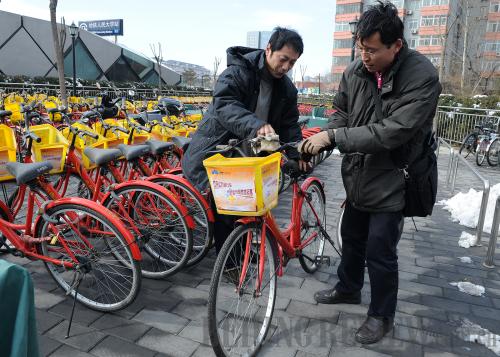|
 |
|
Y ACCESS: A bicycle sharing site near Renmin University Station of Beijing's Subway Line 4. The city plans a citywide bicycle sharing system with more than 50,000 bikes by 2015 (ZHANG XU) |
Compared with other international metropolises, Beijing's car use intensity is much higher. The average yearly mileage of cars in Beijing stands at 15,000 km, 1.5 times that of London and twice that of Tokyo. Meanwhile, 40 percent of car trips in Beijing are less than 5 km, which can be replaced by bikes or other public transportation vehicles, according to Guo Jifu, head of the Beijing Transportation Research Center.
Beijing will prohibit an increase of cars registered to the government for the next five years, says the draft plan. According to national TV broadcaster CCTV, the capital has around 700,000 government vehicles, nearly 15 percent of the city's car ownership.
The draft plan sets a goal of raising the proportion of rides on public transportation to 50 percent of residents' trips in the city center by 2015. Wang Jiangyan, a transportation expert with Parsons Brinckerhoff Engineering Technology (Beijing), told Beijing Times that car owners could opt for public transit if the government could make it more convenient and comfortable.
The Beijing Municipal Government has, in recent years, invested heavily in metro projects in a bid to improve people's access to mass transit.
The city will have a total of 14 metro lines in operation once five newly built metros are added to the network at the end of this year. There were only two metro lines before 2003.
Wang said building cheap-fee parking lots at terminals of metro lines proved effective in attracting car-owning commuters to ride a train to the city center. The draft plan includes measures for the government to invest inn such parking lots nearby metro stations outside the Fourth Ring Road, which will provide more than 30,000 parking spaces in total.
The draft plan says the development of new residential areas and satellite cities will take into consideration of Beijing's industrial development programs, in hopes of enabling local residents to work closer to home. The plan also encourages public welfare organizations and companies to enforce flexible working hours to alleviate traffic jams.
Congestion Easing Measures in the Pipeline
Parking Fees
- The cost of parking in the downtown area will be higher than elsewhere. Parking lots on the ground will also be more expensive than underground facilities.
- The city will be categorized into three zones according to their levels of traffic congestion, with higher parking fees in more congested areas.
Parking Spaces
- More than 50,000 parking spaces will be built in downtown Beijing. Garages and multi-story car parks will be erected at major hospitals.
- An additional 200,000 new parking spaces will become available in old residential communities. Private financing is encouraged for building parking lots.
- Guidance will be issued to government agencies, enterprises and other organizations, urging them to open their car parks for the public.
- To encourage people to use metro, more than 30,000 parking spaces will be opened at subway stations located outside the Fourth Ring Road.
Public Transportation
- More special lanes designated for public transport will appear on main roads and those prone to congestion, such as the Third Ring Road.
- Nine transportation hubs will be built in Beijing and shuttle buses for schools and companies could be allowed to use special lanes for public buses during rush hours.
- Metro lines totaling more than 561 km will be put into operation by 2015 and minimum intervals between the metro trains during rush hours on existing lines will be shortened to raise the transportation capacity.
Bicycle Sharing
- A bicycle sharing system featuring 1,000 sites equipped with more than 50,000 bikes will be completed by 2015.
- A pilot bicycle sharing program will soon be launched, in which more than 200 sites with 10,000 bikes will open to the public at subway stations along Line 4, Line 5 and Batong Line.
Road Construction
- The city will start to construct tunnels on the eastern and western sections of the Second Ring Road in 2011. There will be five fast lanes with an overall length of 37.3 km, due to be completed by the end of 2012.
- 200 km of new roads will be completed in downtown Beijing by the end of 2012.
Traffic Management
- Traffic controls according to the last digit of a car's license plate, odd or even, could be used on congested roads during rush hours.
- A plan on easing congestion will be drafted and updated each year. The results will be compiled and compared in testing the performance of governments at city and district levels.
Source: Beijing Municipal Commission of Transport
| 